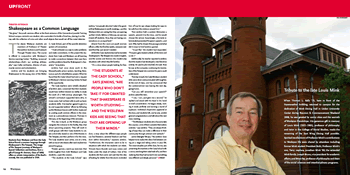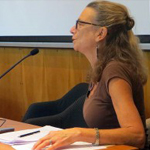THEATER OUTREACH
 “No glass,” the youth services officer at the front entrance of the Connecticut Juvenile Training School campus reminds one student, who surrenders his bottle of iced tea, placing it on the tray with the collection of coins and other small objects that would set off the metal detector.
“No glass,” the youth services officer at the front entrance of the Connecticut Juvenile Training School campus reminds one student, who surrenders his bottle of iced tea, placing it on the tray with the collection of coins and other small objects that would set off the metal detector.
The dozen Wesleyan students are members of Professor of Theater Ron Jenkins’ Activism and Outreach Through Theater class. The course is offered in conjunction with Wesleyan’s Service-Learning Center. “Building reciprocal relationships—that’s our working philosophy,” says Cathy Lechowicz, director of community service and volunteerism.
Jenkins and his students are bringing Shakespeare to the young men of the Walter G. Cady School, part of the juvenile detention system of Connecticut.
“I look at theater as a way to solve problems and make connections. In this project the students from Cady and Wesleyan are all learning to make connections between their own lives and the problems faced by Shakespeare’s characters,” he explains.
Jenkins had once done work in the Massachusetts prison system, teaching literature as part of a rehabilitation project. When he found that the Cady School had sent a request to Wesleyan’s Service-Learning Center, he leapt at the opportunity.
The Cady teachers were initially skeptical of Jenkins’ plan, concerned that their students would have neither interest nor ability to study the work of a 16th-century playwright. The school’s curriculum supported teens who, in many cases, had not been able to pick up basic academic skills. One teacher agreed to give it a try and supported Jenkins’ efforts by following up the Wesleyan lessons with further study and by posting youth services officers in the classroom as a precautionary measure. That was in February, at the beginning of the semester.
This day in April, as the Wesleyan group navigates the entrance to the facility, they chat about upcoming projects. They will work in small groups with their Cady students to create a short skit, based on one of the themes in The Tempest, and then perform it for the class. The Cady students soon arrive, one at a time, with an escort who leaves after each student has joined his group.
Theater games—warm-up exercises that evoke laughter from both Wesleyan and Cady students—open the session.
“The students at the Cady School,” says Jenkins, “are people who don’t take it for granted that Shakespeare is worth studying—and the Wesleyan kids are seeing that they are opening up their minds. Before, in February, we saw very closed-off students. Now, they are having conversations on an equal level.”
Absent from the room are youth services officers. After the first few weeks, everyone realized that they just weren’t needed.
At first the Cady students learned to translate Shakespeare’s The Tempest into modern English, and the scenes and themes into modern-day situations with which they felt familiar.
“It’s a story about people looking for freedom, a story about the different ways people can find freedom—external freedom and freedom within themselves,” explains Jenkins. “Furthermore, the characters seem to be in situations with which the students can relate. Trinculo hears thunder and scary noises and hides under the cloak of Caliban. One of the students did that scene and said that the idea of looking for shelter from the storm reminded him of how he was always looking for ways to be safe from the violence around him.”
Then Jenkins held a contest: Memorize a speech, present it to the class, and he would choose the winner. Surprisingly, a formerly silent student presented Prospero’s speech—and won. Why had he chosen this passage and what did it mean to him? Jenkins queried.
“It just fits,” the student had responded. “Prospero gets treated unfairly all the time and so do I.”
Additionally, his teacher reported to Jenkins that this student had developed a new free-time activity. He used to plot mischief, she said. Now he was at the computer, continuing his translation of the Tempest into a version his peers could understand.
That day in April, the Cady-Wesleyan student skits were clever and punctuated with laughter. At the end of class, one boy announced that the contest-winner was leaving the next day, going home.
“Can you still remember your speech?” Jenkins asked the teen.
“I can, I can?Just give me a second,” he replied and stood with his head in his hand in brief concentration. He began slowly, reciting it nearly perfectly and earning a round of applause. Individual chaperones appeared at the door, and students left, one by one, amidst general congratulations and talk about the next class meeting..
“The Wesleyan students who choose to take this course—a lot of them consider themselves activists,” says Jenkins. “They are always thinking of ways they can make a difference in their community through activism and outreach.”
Jaime Delanghe ’08 says, “Ron Jenkins’ class helped me to realize the direct link between acting on a stage and taking action in your life. The most valuable part of the class, for me, was presenting the students at the Cady School with a scene, watching them take hold of it, and then realizing that they had turned it into something very different and deeply personal.”

